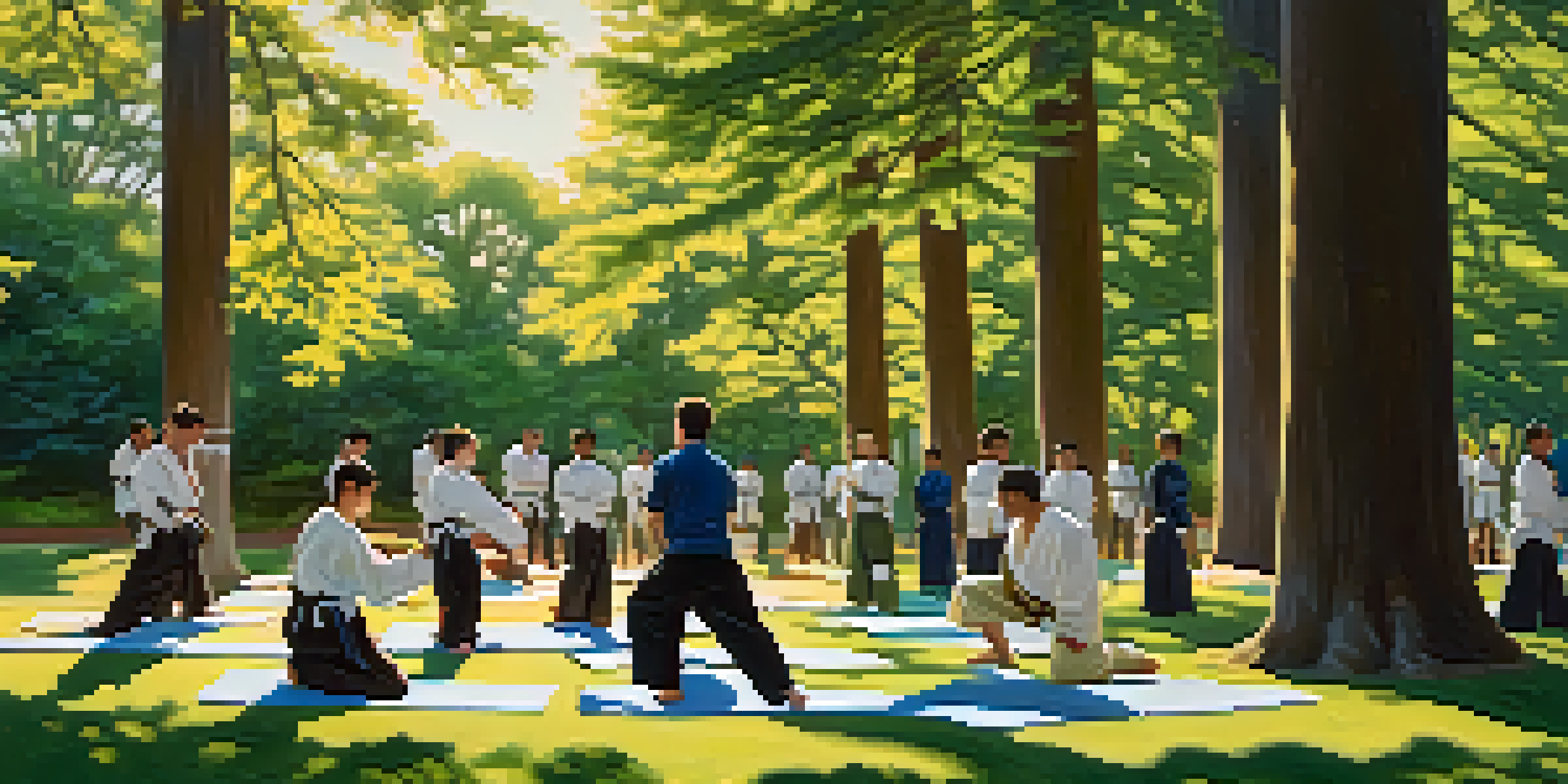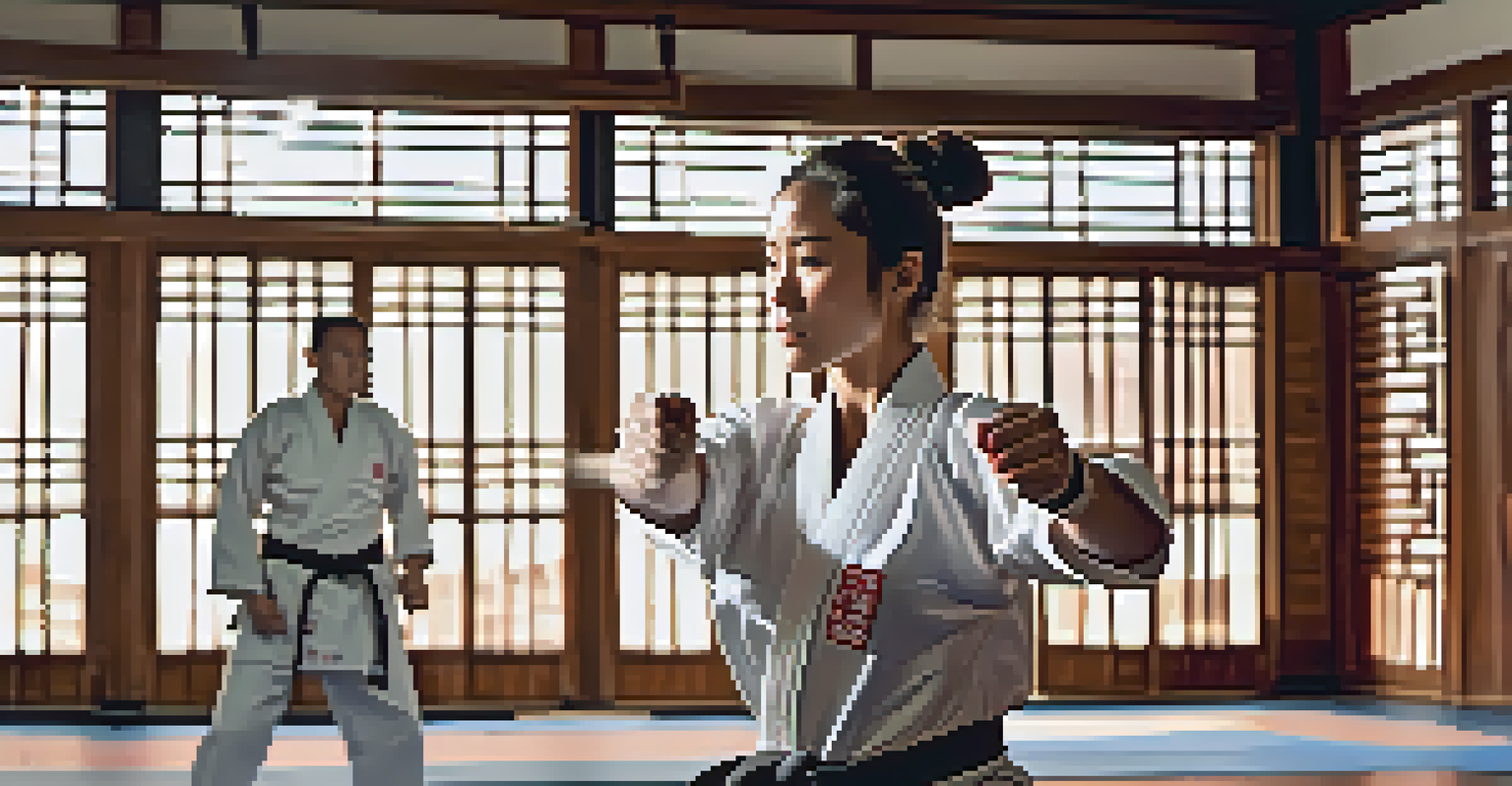The Importance of Self Defense in Building Personal Resilience

Understanding Personal Resilience and Its Importance
Personal resilience is the ability to bounce back from challenges and setbacks. It's about adapting to adversity and maintaining mental well-being in tough situations. Building resilience can significantly improve our overall quality of life, helping us navigate both personal and professional hurdles with confidence.
Life doesn't get easier or more forgiving; we get stronger and more resilient.
In today’s fast-paced world, resilience is more crucial than ever. Life throws various challenges our way, from stressful work environments to personal crises. Being resilient allows us to approach these situations with a proactive mindset, equipping us to handle stress more effectively.
Self-defense training is a powerful tool for enhancing resilience. It not only teaches physical skills but also instills a sense of empowerment and self-confidence. By mastering self-defense techniques, individuals can face life's challenges with a greater sense of security and strength.
How Self Defense Boosts Confidence
One of the most significant benefits of learning self-defense is the boost in self-confidence it provides. When you know you have the skills to protect yourself, you naturally feel more capable in various aspects of life. This newfound confidence can permeate into your personal and professional relationships.

Imagine walking into a room full of strangers or facing a challenging situation at work. With self-defense training, you carry an inner assurance that allows you to engage more openly and assertively. This confidence can lead to more opportunities and stronger connections with others.
Resilience Through Self-Defense
Learning self-defense not only enhances physical skills but also builds mental resilience, empowering individuals to handle life's challenges.
Moreover, the process of mastering self-defense techniques teaches perseverance. Each practice session is a step toward improvement, reinforcing the idea that challenges can be overcome with determination. This mindset is a cornerstone of resilience, translating into other areas of life.
Developing Mental Toughness Through Self Defense
Self-defense isn't just about physical strength; it also cultivates mental toughness. Training often involves scenarios that require quick thinking and decision-making under pressure. This practice helps individuals learn how to stay calm and focused during stressful situations.
The greatest glory in living lies not in never falling, but in rising every time we fall.
Engaging in self-defense training teaches you to confront your fears. Whether it’s sparring with a partner or participating in a self-defense workshop, facing physical challenges can help you become more comfortable with uncertainty. This comfort is essential for developing resilience.
Additionally, the discipline gained from regular practice can extend beyond martial arts. It nurtures a proactive attitude towards life's obstacles, fostering a mindset that views challenges as opportunities for growth rather than as insurmountable problems.
Creating a Supportive Community Through Training
Self-defense classes often foster a sense of community among participants. As individuals train together, they develop bonds and friendships, creating a support system that enhances resilience. This camaraderie can provide emotional strength during tough times.
Training with others encourages accountability. When you know your peers are counting on you, it motivates you to show up and give your best effort. This shared commitment not only improves skills but also reinforces the concept of mutual support in overcoming challenges.
Confidence Boost from Training
Self-defense training significantly increases self-confidence, allowing individuals to engage more assertively in personal and professional situations.
Moreover, sharing experiences and learning from one another can be incredibly empowering. Hearing stories of personal growth and resilience from fellow trainees can inspire you to push through your struggles, reminding you that you’re not alone in your journey.
Self Defense as a Tool for Stress Relief
Participating in self-defense training can serve as an effective outlet for stress relief. Physical activity releases endorphins, the body’s natural stress-relievers, helping to elevate mood and reduce anxiety. This makes self-defense not just a practical skill but also a therapeutic practice.
Moreover, the focus required during training sessions can serve as a form of mindfulness. When you're concentrating on movements and techniques, it takes your mind off daily worries and stresses. This focused practice allows you to reset mentally and emotionally.
Incorporating self-defense into your routine can be an empowering way to manage stress. By taking control of your physical health and mental well-being, you actively contribute to your resilience, equipping yourself to handle life's pressures more effectively.
Setting Goals and Achieving Progress in Self Defense
Setting specific goals in your self-defense training can mirror the goal-setting process in other areas of life. Whether it's mastering a particular technique or achieving a belt rank, each goal achieved boosts your sense of accomplishment and builds resilience. This sense of progress is vital for personal development.
Tracking your growth in self-defense training can also provide tangible evidence of your capabilities. Reflecting on how far you’ve come reinforces the idea that effort leads to improvement. This understanding can be applied to various challenges you may face outside of training.
Community Support in Training
Participating in self-defense classes fosters a supportive community, enhancing emotional strength and resilience through shared experiences.
Additionally, the experience of overcoming obstacles in your training—like learning a complex move or sparring with a more experienced partner—teaches you that perseverance pays off. This lesson is invaluable when facing life’s broader challenges, reminding you that resilience is built through continuous effort.
Empowering Others Through Self Defense Knowledge
Learning self-defense not only empowers you but also creates opportunities to empower others. Sharing your knowledge with friends or family can help them feel safer and more confident, fostering a supportive environment. This ripple effect strengthens community resilience.
Teaching self-defense can also deepen your understanding of the techniques. When you explain concepts to others, you reinforce your own skills and confidence. This cycle of learning and teaching enhances both personal resilience and community strength.

Ultimately, empowering others through self-defense creates a culture of strength and safety. As more individuals feel capable of defending themselves, the overall sense of security within the community increases, contributing to a collective resilience that benefits everyone.